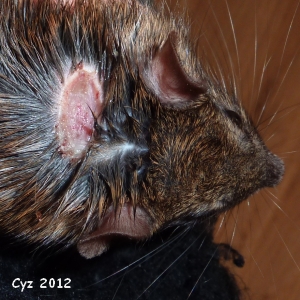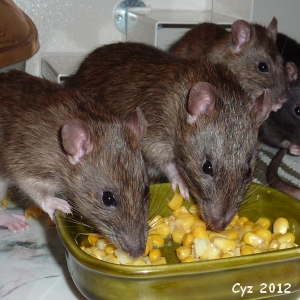Figure 2: Problematic introduction involving territorial aggression with resultant neck bite wound (Phi-Adara)
Case and photos
History
Phi-Adara is part of an (assumed) semi-wild litter that is surrendered to a local rat rescue. (Their domesticated mother escaped from her cage and was pregnant upon her return; all the pups are agouti-selfs or Berkshire/Irish and they display characteristic semi-wild behavior despite intense socialization at a young age.)
Adoption
“Phi” and one of her sisters (both intact females) are adopted at a little over 4 months old, as additions to a resident rat group consisting of two adult domesticated females and one adult castrated semi-wild male, Twix, who has a prior history of inflicting bite wounds during introductions.
Introduction
During the introduction period the two groups are switched into each others cage section as often as possible, with only minor cleaning in between, to let them become accustomed to each others scent.
Initially, being surrounded by the scent of the new rats causes the resident rats to display piloerection (raised fur) and fight amongst themselves. Additionally, they teeth-chatter and “foof” (huff and puff) and push at the (reinforced) closed door between the sections. This reaction diminishes as the introduction progresses. Both groups appear very interested in each other and occasionally attempt to climb into each others cage section.
The introduction itself is conducted on neutral territory (in this case a walk-in shower). On average, one session is held each day, with increasing duration. Due to Twix’s history of aggression, he is not introduced until day 4.
All interactions are closely supervised by someone wearing thick gloves. When agitation (tail writhing) or aggression (piloerection, sidling a.k.a. crab-walking, chasing, or attacking) is displayed, the aggressor is blocked and picked up and given a time-out until his/her fur returns to its normal position. Note that if the aggressor is not picked up, (s)he may redirected his/her aggression towards another rat that is close by, even if this is a familiar cage-mate. This occurred a few times during this introduction, but it did not lead to serious fights.
Although the introduction is clearly stressful for all the rats involved (determined by their rising body temperature, which can be felt at the ears or tail), they remain curious and voluntarily approach each other. Phi is the bravest of the two sisters.
On day 7 (at midnight) an accident occurs while placing the rats into the introduction area: Twix is being carried inside the supervisor’s sweater, when Phi suddenly climbs up the supervisor’s leg and also crawls into the sweater. A fight ensues, during which one of the rats screams. The rats are quickly separated and examined for injuries. Twix has none.
Phi, however, sustains an approximately 1.5cm long clean-cut skin deep wound across the back of her neck. There is minimal bleeding and, although Phi is visibly upset, this is perhaps more so by the agonistic interaction than by the actual injury.
 Photo shows Phi Adara with bite wound to neck area |
Although the wound has not yet healed, the introduction is continued after a two day break.
On day 25, after they have spent several hours together in the introduction area without any problems, an attempt is made at housing all the rats in one cage. Twix, however, displays piloerection and the attempt is aborted.
The next day, while free-ranging together in the evening, Twix sustains a scratch to the corner of one of his eyelids, presumably due to a small argument or playing that got out of hand.
From day 27 the rats are housed together in the same section of the large rat cage, with minimal interior decoration, i.e. no houses or tunnels in which they could corner each other. The size of the section is gradually increased.
On day 30 the introduction is declared a success (note that the introduction involved only 20 days of actual physical interaction).
Outcome
There are still occasional squabbles, mainly between the resident adult and young newcomer females, but no serious injuries have occurred since.
Twix appears quite fond of his new cage-mates. Interestingly, Phi is the only female with whom he is romantically involved.
 Photo shows from left to right: Phi, Twix, Sigma, Luna and Lily together in their cage, following successful introductions, eating cooked corn |
Introduction description and photos courtesy of Cyzahhe


